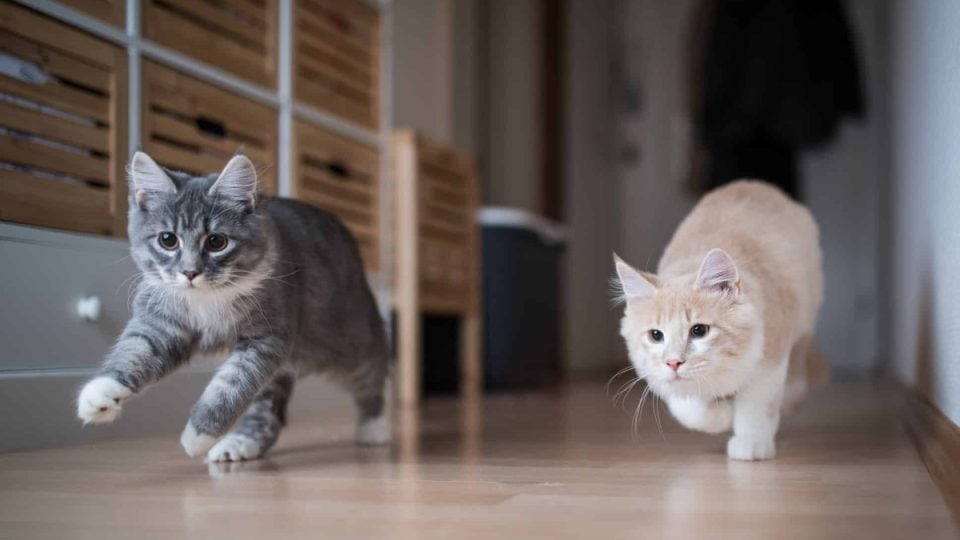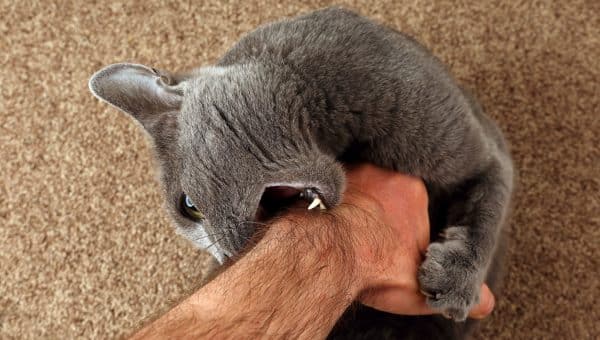Realizing your cat is missing can be a pet parent’s worst nightmare. Luckily, cats usually only run away for a few hours. That’s because they have an excellent homing instinct that helps guide them back even when they stray outside their usual territory.
There are many reasons why cats run away from home, including fear, searching for a mate, looking for somewhere quiet to give birth, or simple curiosity. “It’s unlikely that many cats actually ‘run away’ in the sense of purposefully leaving their current home,” says Head Veterinarian of Cooper Pet Care, Patrik Holmboe. “The easy shelter and food their home provides is an enormous benefit over living on the street,” he adds. Most of the time, your cat’s instincts are the reason they go missing, and this behavior is completely normal.
There are lots of ways to stop your cat from running away, but the first step is figuring out why your cat may be spending more time away from home than normal. Before you’re faced with the worry of trying to find a missing pet, here’s why cats run away in the first place — and what you can do to keep your cat safe.
Your Cat Is In Heat
Unneutered cats have a strong reproductive instinct, and males may travel a lot farther from home than you might expect as they look for a female in heat. When a female cat is in heat, she’ll be on the lookout for a mate too, and may try to escape if she’s an indoor cat. Unneutered cats may fight over territory and mates, so there are risks that your cat could get injured, or you may have to cope with an unexpected litter of kittens!
Pro Tip: Spay or neuter your cat. If your cat isn’t searching for a mate, they’re much less likely to stray far from home.

iStock/ablokhin
Your Cat Is Being Territorial
Cats are territorial and outdoor cats will often claim a specific zone around your house as theirs. If there aren’t many other cats living nearby, your cat may start to expand their territory. So while they may not be specifically running away from home, if they create a larger territory they may go missing for longer than you expect — before coming home again!
Pro Tip: Keep them indoors. In addition to reducing the risks of your cat running away to mark territory, indoor cats tend to live longer.
Your Cat Is Ready To Give Birth
Pregnant cats will often look for somewhere quiet and secluded so they can feel safe as they’re preparing to give birth. If your cat can’t find a suitable spot at home, then she may be tempted to look elsewhere.
Pro Tip: Make sure your pregnant cat has a safe space to give birth to her babies and nurse them to avoid her from leaving.
Your Cat Is Curious
While some cats love to nap the day away at home, others have a curious streak and love to explore. They might set off to chase a butterfly, make friends with a kid in the neighborhood, or just set out to see where the day takes them. Sometimes these adventures can take longer than your cat might expect!
Pro Tip: For your curious cat, build them a catio. This offers a safe space for your cat to enjoy the great outdoors without the worry of them running away.

iStock/Simona Weber
Your Cat Wants To Hunt
Most cats might love snuggling on our laps but don’t forget that they’re also instinctive hunters. This behavior is deeply ingrained, and while some cats will enjoy hunting their toys at home, others will be on the lookout for things they can stalk and pounce on out in the wild. Even if your cat has plenty of food at home, they’ll still need to fulfill that basic hunting instinct.
Pro Tip: Provide plenty of enrichment or interactive toys for your cat to hunt. If they have enough of a challenge, your cat won’t be tempted to hunt outside.
Your Cat Is Living A Double Life
We’re sorry to break it to you, but some cats do cheat on their owners! If your curious cat comes across a friendly neighbor then they may choose to hang out at their home instead of yours. If this person offers them tasty treats, these trips could become a regular occurrence. Make sure your cat is wearing a collar so local people know your cat isn’t a stray in need of a new home.
Pro Tip: If you can’t stop your cat from leaving you, train them to return home. Many cats love the mental stimulation of training sessions, and teaching them to come when called is a very handy trick!
Your Cat Is Stressed
Cats are sensitive souls and can become upset if their home or routine changes significantly. Renovations, unusual loud noises (hello, new baby!), bringing a new pet home or even just moving your furniture can all potentially stress out your cat. If they can’t find somewhere at home to hide away until things settle down, they may run away in an attempt to find some peace and quiet elsewhere.
Pro Tip: Create a safe space in your home where they can retreat to. Just like us, cats deserve a safe space where they can go to destress.

iStock/w-ings
Your Cat Feels Neglected Or Abandoned
If your cat doesn’t get enough food, water, and affection at home then they may simply decide to come home less and less often. If you leave your cat for hours or even days home alone, they may run out of food and think they’ve been abandoned. As they get hungrier and hungrier, they’ll roam further away looking for something to eat.
Pro Tip: Make sure your cat gets enough attention. If your cat isn’t physically and mentally stimulated, they may get bored and wander off to somewhere more exciting.
Your Cat Is Afraid
There are plenty of things in day to day life that can scare our cats. Unexpected fireworks, sudden changes at home, or being chased by a dog can all trigger your cat’s natural fear response. While some cats will freeze, others will be sent into flight mode and run away. Sometimes by the time the adrenalin has worn off, your cat may be far from home and outside their usual territory.
Pro Tip: Ensure your cat feels secure. If your cat gets afraid, give them a calming treat, a calming cat suit, or calming pheromones.
Your Cat Is Sick
When a cat is sick, their first instinct is to find somewhere to hide away alone. Unfortunately if your cat doesn’t find somewhere indoors, they might start looking outside. Sick cats left to fend for themselves outside are more vulnerable to predators or could be attacked by other neighborhood cats.
Pro Tip: Take your cat to the vet. At the first sign of illness, it’s important to seek our professional help so if your cat has an illness, they won’t feel the need to escape.

iStock/fatihhoca
Do Cats Come Back When They Run Away?
“Most cats do find their way home,” says Holmboe. “While of course we always hear about the cats who do get lost, it is important to remember that many, many pet parents let their cats outdoors, and the vast majority of them make it safely home every day,” he adds.
Lost Pet Research found that most cats go missing for between five and seven days. But some cats have found their way home after an amazing two and a half years! Usually, missing cats are found within four miles of their home, although there are reports of cats finding their way home from 80 miles away!
If you’re curious where your cat goes when they run away, Holmboe suggests using a GPS-tracking collar. “With this, owners can get a picture of where their cat wanders on a given day. What we see is that most (but not all of course) cats don’t wander too far from their home and spend most of their time within a mile radius,” he says.
What if my cat hasn’t returned home?
While most cats return safely home, none the worse for wear, others sadly don’t. Here are common reasons why cats might not return home. These include the following.
- Theft (if your kitty is a valuable breed, they’re more vulnerable to this)
- Predation by local wildlife
- Being rounded up by animal control
- Your cat is injured and may not be able to return home
- They’re trapped somewhere nearby
- They jumped into a car, and the driver didn’t notice

iStock/ptaxa
How Do Cats Find Their Way Back Home?
“There’s no magic in how cats find their way home,” says Holmboe. “As they spend more and more time in a given area, they learn their surroundings just like a human would. This allows them to know where they are, and how to get home. Additionally, cats often explore via consistent paths, branching off in small forays to explore more,” he adds.
Cats do have a homing instinct, which can help them find their way home when they stray further afield. It’s not well understood how this instinct works, but it’s thought to be linked to the earth’s geomagnetic field. The homing instinct, or PSI trailing, is defined as an animal’s ability to return home from a great distance. Research into this instinct found that cats who live both indoors and outdoors seem to have a much better ability to find their way home.
How To Find A Lost Cat
“The most important things are to be proactive, and not give up!” says Mikel Delgado, a cat behavior expert with Rover. “Many cats stay close to home, so there’s a good chance your cat is hiding in a neighbor’s yard,” she adds.
Delgado’s recommendations for finding your missing cat include:
- Distributing fliers across your neighborhood. Make sure to include a recent clear photo and if possible, a reward
- Posting in local groups on social media, and sites like Pet FBI
- Walking the neighborhood calling your cat’s name or shaking a box of treats
- Putting their bed or blanket outside
- Asking neighbors to check garages, sheds, and crawl spaces
- Calling local veterinarians, rescue centers, and animal control
- Looking for your cat at dawn and dusk when they’re likely to feel safer
- Using a feral cat trap in the area your cat has been spotted
- Using wildlife trackers and motion sensitive cameras to see if they’re still visiting your backyard

iStock/RyanJLane
How Can I Prevent Them From Running Away?
The best time to take action is before your cat goes missing. To stop your cat from running away, consider:
- Microchipping your cat. Once your cat is microchipped, they can still be traced back to you (just make sure you keep your contact details updated!)
- Keeping windows and doors closed. It only takes a second for an indoor cat to slip out of an open window or door, and indoor cats often have less of a homing instinct if they do get lost.
- Leash-training your cat. Some cats love going for walks on a leash, while others aren’t so keen. The best thing is to give it a go and see what your cat thinks!
- Using a GPS collar. Link this to an app on your phone, and you’ll always be able to see where your cat is — even when you’re not at home.
Show your cat that home is where they belong
As we’ve discussed, cats tend to run away when they’re not happy with their current environment and want a change. The best way to stop your cat from running away is to proactively create the right home environment for them. The right environment includes plenty of toys, lots of pets and cuddles, and enrichment that never ends. If your cat feels safe and secure at home, they’re much less likely to head off on an adventure. Make a start by finding out how to tell if your cat loves you, and how to make sure you’re their favorite person!





